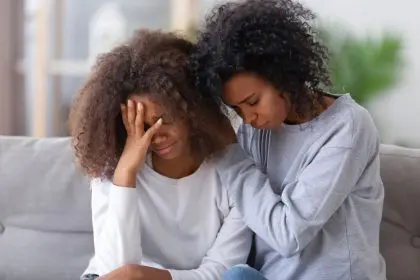In a powerful conversation about mental health advocacy and personal growth, Keshia Dennis, founder and CEO of The Elephant in the Room, Inc., brings her decade of experience to the forefront of mental wellness discussions. As a life coach to NFL Pro Bowl and Super Bowl champions, NBA players, and collegiate athletes, Dennis has established herself as a trusted voice in both professional sports and community mental health. Her organization, which serves as the NFLPA’s charitable partner for mental health, emerged from her personal journey with anxiety as a young teen.
Recently named among the Top 25 Mental Health & Wellness Trailblazers by Black Female Therapists and Black Girl Vitamins, Dennis has transformed her early struggles into a global mission, creating safe spaces for others to heal and grow, particularly within the Black community.
[Editor’s note: This is a truncated transcription of a longer video interview. Please see the video for the extended version. Some errors may occur.]
What inspired the name “The Elephant in the Room”?
I was trying to come up with something that truly exemplifies what mental health really is. Over and over, I kept saying, “It’s really just something that no one really wants to talk about.” Then it clicked. I realized, “It’s like the elephant in the room.” When people ask me about it, it starts a good conversation. That aligns with my ultimate mission of talking about mental health a lot more.
What does the Black community lose when we remain silent about mental health?
We’re losing our power—most importantly, our power. We’re losing our voices to truly speak up, be honest, open, and talk about things that matter the most to us, especially in our most vulnerable moments. Some of my most cherished moments are the ones I share, even if they aren’t as “pretty” as people might expect. But those are the moments that spark change and define who I am—and who others are.
How important is creating vulnerable, safe spaces for the Black community to discuss mental health?
I think it’s incredibly important—probably one of the most important things we can do. We do ourselves a disservice by being silent about what we’ve been through as a Black community. Historically, we’ve been taught not to talk about what happens at home, or among friends, neighbors, and schools. That silence strips us of our power.
In other communities, mental health resources are normalized, but we struggle because we’re hesitant to ask for help. That needs to change. We should normalize conversations about therapy just like we discuss who does our hair, makeup, or lashes. Asking questions like, “Who’s your therapist?” or “How can I support you?” should be just as common.
What should we understand about the impact of early childhood trauma?
It’s critical for us to acknowledge these experiences. While we might be behind compared to other communities, we’ve been making progress in addressing childhood trauma, breaking generational curses, and using our past to become better adults and parents.
Many of us created unhealthy relationships and lacked boundaries because of unresolved trauma. That impacts how we interact with others, especially as a Black community. Talking about mental health allows us to better protect ourselves and be of service to the generations ahead.
What practices have you found beneficial for mental health?
When I entered the wellness space, I thought I was practicing mindfulness. But it wasn’t until I became intentional about my practices that I truly embraced it. For me, I always choose peace. My number one rule is: if it doesn’t make me happy, I don’t do it—bottom line.
Sometimes people don’t realize that when you say yes to too many things, you’re also saying no to yourself. We can’t do everything for everyone and still show up for ourselves. I work out two to four times a week, and those sessions truly energize me. I also do a lot of journaling—I even created a journal called The Honesty Journal.
I practice breath work, grounding, and taking long walks. I adore sunsets, so much so that I often plan my entire day around catching the sunset because it brings me so much joy.
What advice would you give someone looking to connect with moments like watching a sunset?
One of the first things I would encourage someone to do is to simply be present. Often, we forget to live in the moment. It’s so important to be grateful for where you are right now.
Secondly, allow yourself the permission to be in that space and enjoy it. Believe it or not, many people don’t give themselves permission to just be. Sometimes they feel like they don’t deserve those moments or that it’s not worth it.
Lastly, make a conscious decision to embrace the moment. Whether it’s for spiritual reasons, to hear your own thoughts more clearly, or to feel connected to the world around you, those moments matter.
What happens in those quiet moments alone with your thoughts?
Peace and clarity—a lot of it. People who know me know that I truly enjoy my own company. I think that’s powerful in itself, especially in the industry I’m in. I serve so many people and give so much of myself. That 45 minutes alone can give you a chance to reboot, reground, and refocus.
How important is self-forgiveness for mental health?
What I find most important is acknowledging and experiencing the emotions that come with disappointment, sadness, or frustration within ourselves. It’s okay to sit in those emotions at times, but not for too long. Giving yourself grace throughout the process is key to self-forgiveness. It’s a sequence of emotions—disappointment, reflection, and then forgiveness—that plays a part.
Why are boundaries crucial for mental health today?
Setting boundaries is extremely important. When you establish boundaries, you gain more control over your life and decisions, and you feel more comfortable with the choices you make. Without boundaries, you can end up in situations where you lack control, which might lead to anxiety. Boundaries are vital in relationships—whether with others, at work, or even with yourself. They serve as one of the best tools to protect your mental health.
What are two emotional words that are underrated but should be used more often?
No. And let that be a complete sentence. People often feel the need to explain their decisions or seek validation, but simply saying no can be enough. It doesn’t mean there’s ill intent behind your decision; it just means you’re standing firm.
Yes. Say yes to things that challenge you, even if they make you uncomfortable. For example, saying yes to responsibilities that need immediate attention or to things that help you grow. It’s about prioritizing what truly matters in your life.
Sometimes it’s not just yes or no. What else works for you in navigating decisions?
I’ve learned the power of saying, “I’m not sure; I’ll get back to you.” Sometimes people expect immediate answers, but if you don’t have the mental capacity or bandwidth to respond, it’s okay to take time. It doesn’t have to be a no or yes—it can simply be “not right now.”
What are your core speaking topics for those interested in The Elephant in the Room?
The power of identity, self-awareness, and prioritizing your mental health.

















